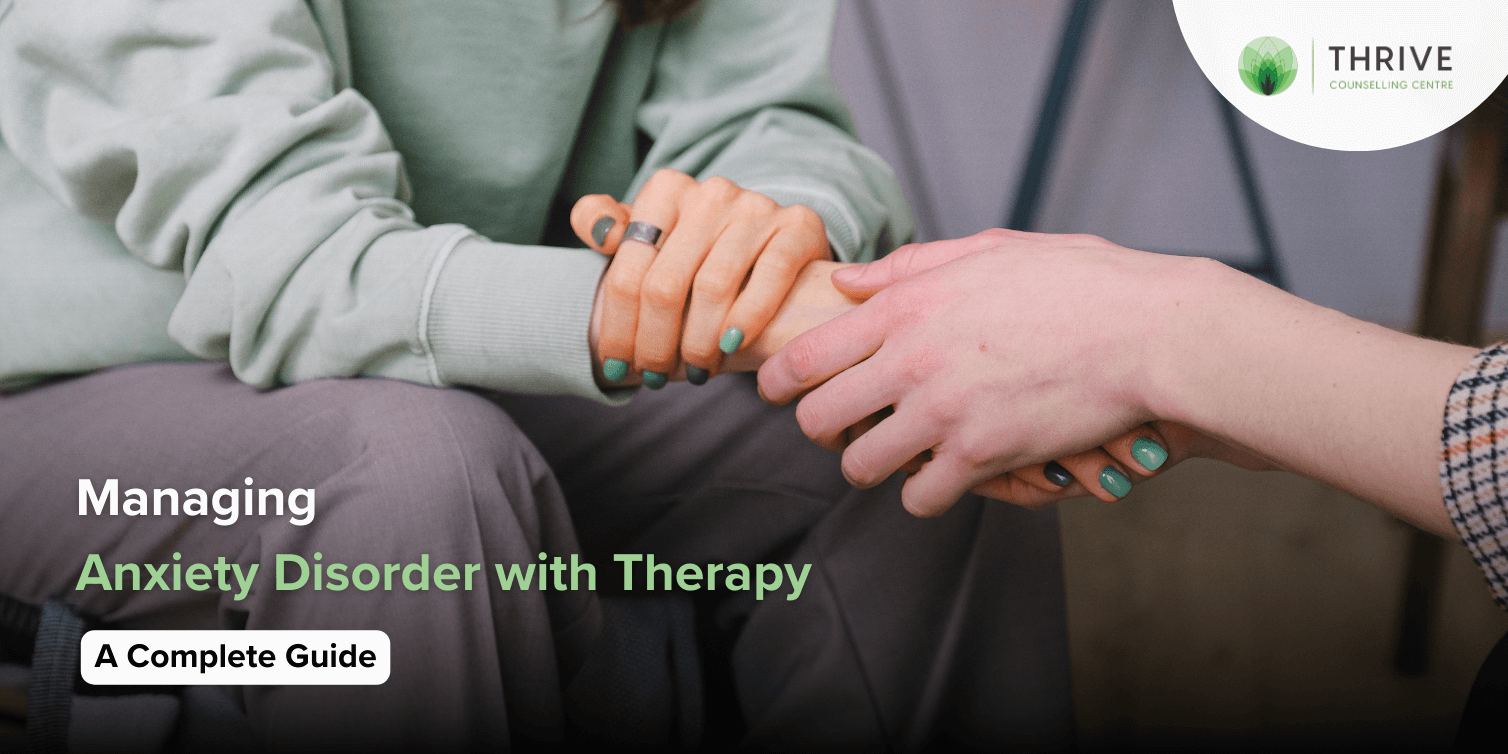Explore proven techniques through counselling for anxiety disorder programs
Explore proven techniques through counselling for anxiety disorder programs
Blog Article
Effective Methods in Counselling for Stress And Anxiety Problem: A Path to Recovery
When dealing with anxiety disorders, you might really feel overloaded and unsure of where to turn. Reliable coaching approaches can lead the way for recuperation, offering you with the tools to navigate your challenges. From cognitive-behavioral methods to mindfulness practices, each technique uses one-of-a-kind benefits. Comprehending how these approaches collaborate can make a significant difference in your trip. So, what are the crucial parts that will lead you in the direction of lasting adjustment?
Recognizing Anxiousness Problems: A Comprehensive Summary
When you think of stress and anxiety problems, it's important to recognize that they encompass a range of problems characterized by excessive concern or concern. These conditions can manifest in various methods, consisting of generalised stress and anxiety condition, panic condition, and social anxiousness condition. You might experience signs like rapid heart beat, sweating, or trouble focusing. It prevails to really feel overloaded, and these feelings can disrupt day-to-day life.Understanding the root causes of anxiousness is essential - counselling for anxiety. They can come from genetics, brain chemistry, or environmental aspects. You might discover that specific scenarios cause your stress and anxiety, making it vital to identify these triggers
Cognitive Behavior Modification (CBT): Reshaping Thought Patterns
Cognitive Behavior Therapy (CBT) provides powerful tools for reshaping the thought patterns that add to stress and anxiety conditions. With CBT, you'll learn to recognize and challenge adverse ideas that sustain your stress and anxiety. Rather than letting anxiety determine your activities, you'll deal with reframing those ideas right into more favorable, realistic ones. This process helps you break the cycle of anxiety by modifying exactly how you regard situations.You'll additionally create dealing strategies to handle anxiousness in real-time. By practicing exposure methods, you'll gradually encounter your fears in a regulated way, reducing their power over you. Additionally, you'll acquire abilities to problem-solve and navigate difficult circumstances more effectively.CBT is structured and goal-oriented, which indicates you'll see development as you use what you find out in therapy to your every day life. With dedication and method, you can noticeably decrease your anxiousness and boost your total wellness.
Mindfulness and Relaxation Techniques: Growing Present-Moment Recognition
Mindfulness and relaxation methods help you cultivate present-moment understanding, allowing you to take care of anxiety much more successfully. By concentrating on the right here and currently, you can break free from the cycle of concern and rumination that usually fuels anxiousness. Begin by exercising deep breathing exercises. Breathe in slowly via your nose, hold for a moment, after that exhale through your mouth. This simple method can soothe your mind and body.Engage in mindfulness reflection by alloting a few minutes daily to observe your ideas without judgment. Focus on your breath, feelings, and the noises around you. You may likewise find worth in dynamic muscle relaxation, where you tense and unwind each muscular tissue group, promoting psychological and physical ease.Incorporating these strategies right into your daily routine can develop a better feeling of control, minimize anxiousness signs and symptoms, and enhance your general health. Keep in mind, consistency is vital to experiencing the benefits.
Exposure Therapy: Encountering Worries Gradually
Exposure treatment helps you face your fears gradually, enabling you to construct confidence gradually. By utilizing progressive exposure techniques, you can slowly challenge what makes you distressed while creating effective coping mechanisms. This procedure not just minimizes your concern however also equips you to manage stress and anxiety more successfully.
Gradual Direct Exposure Methods
When you challenge your anxieties gradually, you can properly lower anxiousness and regain control over your life. Progressive direct exposure strategies include encountering your concerns tip by action, beginning with much less intimidating scenarios. You might begin by thinking of the feared scenario, then advance to watching images or video clips associated with it. Ultimately, you can exercise confronting the anxiety in reality, yet just when you feel ready. This technique allows you to build self-confidence as you move through each stage. Remember to rate yourself; hurrying can boost anxiety. Celebrate small success along the means, as each progression equips you. By continually applying these strategies, you'll discover that your fears start to lose their hold on your mind.

Building Coping Systems
Structure efficient coping devices is crucial for managing anxiety, especially as you face your worries gradually with exposure therapy. Beginning by identifying your specific fears and damaging them down right into convenient actions. In this manner, you can progressively challenge each fear without becoming overloaded. For instance, if you battle with social situations, beginning by practicing small interactions, like welcoming a neighbor.Alongside progressive direct exposure, integrate leisure strategies such as deep breathing or mindfulness to relax your mind prior to facing triggers. Keep a journal to track your development and commemorate tiny triumphes. Border on your own with supportive pals or a specialist who can guide you. Remember, it's a journey-- perseverance and persistence will certainly reinforce your coping systems, bring about higher strength against anxiousness.
Supportive Counseling: Structure Trust Fund and Connection
To successfully support someone with stress and anxiety, developing trust fund and connection is essential from the extremely first session. You'll intend to create a secure room where they feel comfy revealing their thoughts and feelings without judgment. Active listening is vital; program genuine rate of interest in what Read Full Report they share. Acknowledge their sensations and verify their experiences. It's essential to be understanding, as this assists build a connection and motivates openness.Be constant in your method and keep privacy to more strengthen that trust fund. Use open body movement and make eye contact to communicate your attentiveness. Bear in mind, your perseverance goes a lengthy way; building connection requires time, and it's crucial to respect their speed. By fostering this supportive atmosphere, you'll empower them to engage even more fully in the healing procedure, making it easier for them to discover their anxiety and pursue recuperation.
Group Therapy: Shared Experiences and Collective Recovery
Group treatment can be a powerful tool for those handling stress and anxiety conditions, as it allows people to share their experiences and discover solace in the understanding of others. In this helpful atmosphere, you can express your sensations without fear of judgment. Hearing others' stories can stabilize your own experiences, making you feel much less alone in your struggle.Participating in group therapy helps you develop coping approaches with shared knowledge and understandings. As you listen to others, you might discover brand-new means to tackle your stress and anxiety that you hadn't considered before.Moreover, the collective healing that occurs in these sessions can promote a sense of community, advising you that you're not facing your difficulties alone.Building connections with others who comprehend your struggle can boost your self-confidence and inspiration to challenge your anxiety. Group treatment produces a room where development and recovery become a shared journey, encouraging you to take steps towards recovery.
Incorporating Way Of Living Modifications: Alternative Methods to Anxiousness Administration
While treatment offers essential assistance, integrating lifestyle changes can greatly improve your ability to handle anxiety - counselling for anxiety. Start by including normal physical task right into your routine. Workout releases endorphins, which can boost your state of mind and reduce tension. Next, pay focus to your diet regimen. Eating a balanced diet rich in fruits, vegetables, and whole grains can positively influence your psychological wellness. Don't fail to remember regarding sleep-- aim for 7-9 hours per night, as high quality rest is vital for psychological regulation.Mindfulness practices, such as meditation or yoga, can additionally aid you stay grounded and existing. Think about reserving time each day to practice these methods. Ultimately, restriction caffeine and alcohol usage, as they can aggravate stress and anxiety signs. By making these alternative modifications, you develop a stronger foundation for taking care of stress and anxiety, matching the advantages gained from therapy. Remember, every tiny step matters on your course to recovery

Regularly Asked Questions
What Are the Typical Physical Signs of Stress And Anxiety Disorders?
Usual physical signs and symptoms of stress and anxiety conditions include quick heart rate, lack of breath, muscle stress, sweating, and migraines. You could additionally experience fatigue, wooziness, or gastrointestinal problems, which can further complicate your life.
Exactly How Long Does Therapy for Anxiousness Typically Take?

Can Stress And Anxiety Problems Be Totally Cured?
While anxiousness conditions can't always be totally healed, you can manage your signs and symptoms efficiently. With the best strategies and support, you'll locate ways to minimize anxiousness, boost your health, and lead a satisfying life.
What Should I Perform in a Panic Assault?
Throughout a panic attack, emphasis on your breathing. Inhale deeply via your visit nose, hold for a minute, after that exhale slowly. Ground yourself by naming objects around you, and advise yourself it will pass.
Exist Medications for Anxiety Problems?
Yes, there are a number of medicines for stress and anxiety problems, consisting of benzodiazepines and antidepressants. You must get in touch with a medical care specialist to locate the ideal therapy strategy customized to your specific requirements and situations for the best results. When you believe concerning stress and anxiety disorders, it's vital to recognize that they incorporate a range of problems identified by excessive anxiety or worry. These disorders can show up in various ways, including generalised anxiety problem, panic condition, and social stress and anxiety problem. Building efficient coping systems is important for taking care of stress and Go Here anxiety, specifically as you face your anxieties gradually via exposure treatment. Team therapy can be a powerful tool for those dealing with anxiety problems, as it enables people to share their experiences and locate relief in the understanding of others. As you pay attention to others, you might find new methods to tackle your stress and anxiety that you hadn't thought about before.Moreover, the cumulative healing that happens in these sessions can cultivate a feeling of neighborhood, advising you that you're not encountering your obstacles alone.Building connections with others who comprehend your struggle can boost your confidence and inspiration to challenge your anxiousness.
Report this page